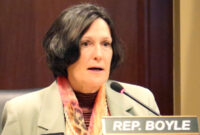With limited debate — and one senator using verse to voice his objections — the Senate agreed to put $550,000 toward a new statewide reading test.
The vote paves the way to roll out a new, online reading test in kindergarten through third-grade classrooms, starting in the fall of 2018. In the short term, the Senate vote resolves one of the last unresolved issues of the 2018 legislative session, which is likely to adjourn by the end of the week.
Thursday morning’s vote centered on House Bill 717, a rewritten budget for state superintendent Sherri Ybarra’s office. The budget was virtually the same as one the Senate passed one week ago, with a notable exception: It included $383,800 to launch the statewide reading test. Coupled with $166,200 in the overall K-12 budget, Ybarra will have $550,000 for the rollout.
The Legislature’s Joint Finance-Appropriations Committee inserted the reading test money in the aftermath of Friday’s insurrection on the House floor. The House abruptly rejected the first version of the Ybarra budget, which omitted money for the reading test.
The reading test fight has pit Ybarra, Gov. Butch Otter and the State Board of Education against legislative critics. Several key lawmakers say they aren’t sold on the new test — which has been piloted in more than 50 schools statewide — and have said local districts should be able to use the reading test of their choice.
Senate Education Committee Chairman Dean Mortimer has been one critic of the statewide test. The Idaho Falls Republican did not debate against the budget Thursday. Instead, he stood during the roll call to explain his vote, and recite a 60-second poem outlining his objections. Adopting a statewide test without gathering teacher input, he said, is “like using dirt instead of cement.”
But following the House’s lead from Wednesday, the Senate overwhelmingly passed the new budget, on a 27-6 vote. Two of Mortimer’s Senate Education colleagues also opposed the bill: Sens. Steven Thayn, R-Emmett, and Jim Guthrie, R-Inkom. Also voting no were Sens. Cliff Bayer, R-Boise; Jim Rice, R-Caldwell; and Steve Vick, R-Dalton Gardens.
Afterwards, Mortimer was philosophical about the vote. “There is a time to fight, and a time to make peace,” he said during a break in the Senate floor session.
HB 717 now heads to Otter’s desk; he has signaled his support for the new spending plan.
The Senate’s vote leaves both houses with only a handful of bills remaining on their calendar. The Legislature could wrap up its official work later Thursday. The Legislature cannot formally adjourn until all bills have arrived at Otter’s desk, however, and it’s unclear how long that process will take.
Charter school administrators
A bill designed to create a new charter school administrator’s certificate was one of the final education bills to clear this House late in the session.
On Thursday morning, the House voted along party lines to pass House Bill 566aaS.
The bill would allow administrators without any education experience to obtain a new certificate designed especially for charter school leaders.

Sponsoring Rep. Judy Boyle, R-Midvale, said the bill is necessary to support school choice and to allow charter schools to innovate and enjoy a degree of flexibility.
“I ask we continue this experiment with charter schools and let parents decide where they would like to take their children.”
Charter school administrators would still need to pass a background check, hold a bachelor’s degree and complete a course in teacher evaluations.
Earlier this month, the Senate amended the bill, requiring charter school administrators to also meet at least one of the following criteria:
- Five or more years’ experience administering a public charter school.
- A post-baccalaureate degree, and a minimum of five years’ experience in school administration, public administration, business administration or military administration.
- Completion of a nationally recognized charter school leaders fellowship.
- Five years’ teaching experience.
But House Democrats still opposed the bill. Rep. John McCrostie, a Garden City Democrat and music teacher, said the first version of the bill made it so that the standards for becoming a charter school administrator would have been less than requirements for becoming a public school classroom teachers.
“The amendments made to this bill, I do concede, make improvement upon that,” McCrostie said. “But I don’t think this goes far enough so I will be voting no.”
The House passed the bill on a 58-11 vote. It passed the Senate Monday on a 23-10 vote, so it heads next to Otter’s desk.
Idaho Education News reporter Clark Corbin contributed to this report.
